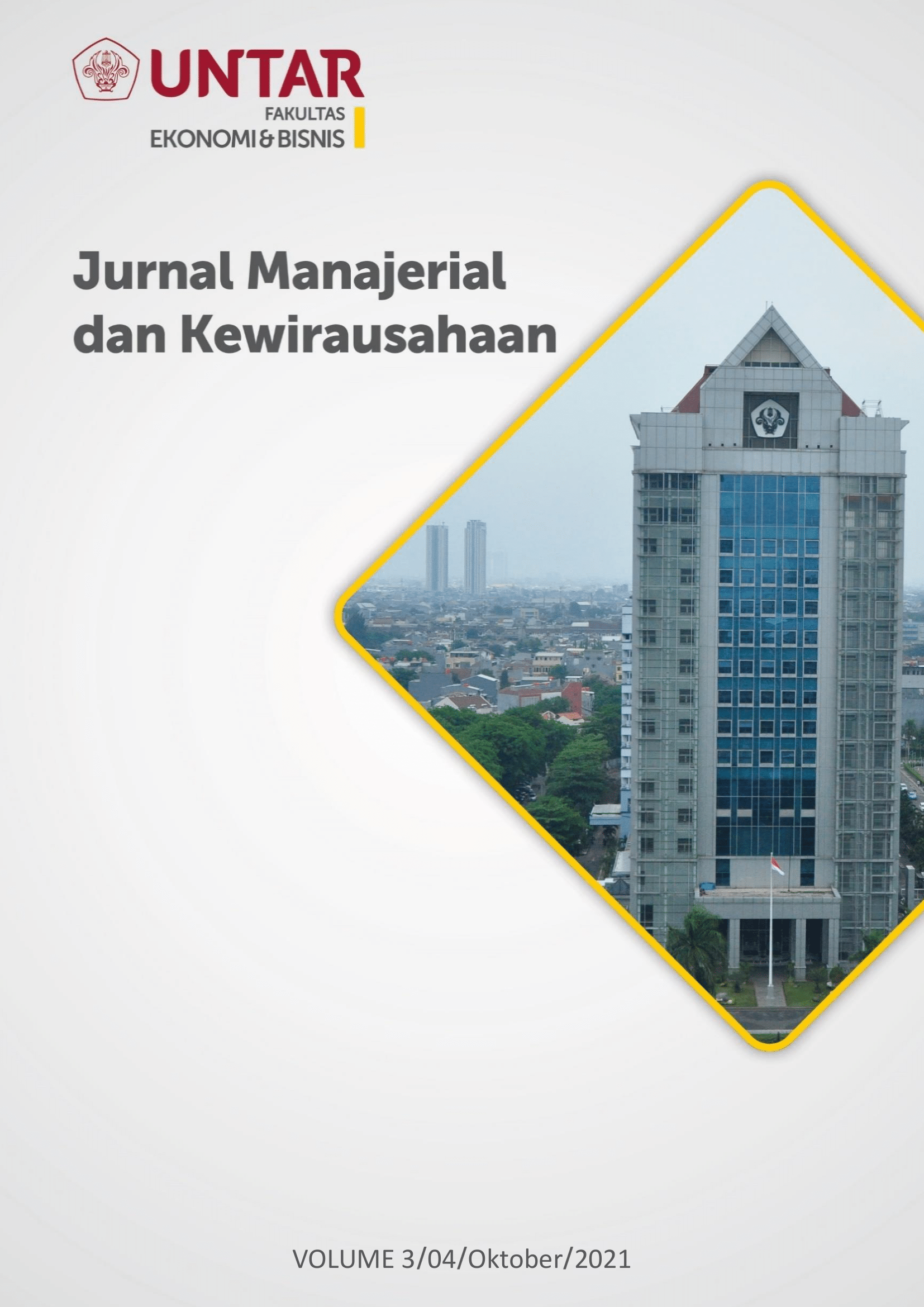Pengaruh Budaya Teknologi Informasi Terhadap Kesuksesan Kewirausahaan Digital Pada Wirausaha Di Jakarta
Main Article Content
Abstract
The purpose of this study is to determine: 1) the impact of information technology culture on digital entrepreneurship success, 2) the impact of personal innovativeness that affects the relationship between information technology culture and digital entrepreneurial success, 3) the impact of experiences that affect the relationship between information technology culture and digital entrepreneurship success. The sampling technique used in this research is non-probability sampling and convenience sampling technique. Data in this research was collected by using a questionnaire and distributed via the google form with 130 respondents but only 110 data that can be used. Data in this research was processed by using SmartPLS v.3.3.3. The sample in this study are entrepreneurs based in Jakarta and have businesses in the clothing, culinary, beauty, and electronics fields with 18-45 years age range. The results of this study are: 1) information technology culture has a positive and significant effect on digital entrepreneurship success, 2) personal innovativeness has a positive and significant effect, also moderates the relationship between information technology culture and digital entrepreneurship success, 3) experience has positive and significant effects also moderates the relationship between information technology culture and digital entrepreneurial success.
Tujuan dari penelitian ini yaitu untuk mengetahui: 1) pengaruh budaya teknologi informasi terhadap kesuksesan kewirausahaan digital, 2) keinovatifan seseorang yang mempengaruhi hubungan antara budaya teknologi informasi dengan kesuksesan kewirausahaan digital, 3) pengalaman yang mempengaruhi hubungan antara budaya teknologi dengan kesuksesan kewirausahaan digital. Teknik pemilihan sampel yang digunakan pada penelitian ini yaitu nonprobability sampling dan menggunakan teknik convenience sampling. Pengumpulan data menggunakan kuesioner yang didistribusikan melalui internet dengan google form dengan total 130 responden namun hanya 110 data yang dapat digunakan. Pengolahan data dalam penelitian ini menggunakan SmartPLS v.3.3.3. Sampel dalam penelitian ini yaitu wirausaha yang berdomisili di Jakarta yang memiliki bisnis dalam bidang pakaian, kuliner, kecantikan, dan elektronik dengan rentang usia 18-45 tahun. Hasil analisis dari penelitian ini yaitu: 1) budaya teknologi informasi terbukti berpengaruh secara positif dan signifikan terhadap kesuksesan kewirausahaan digital, 2) keinovatifan seseorang terbukti berpengaruh secara positif dan memoderasi hubungan antara budaya teknologi informasi dengan kesuksesan kewirausahaan digital secara semu, 3) pengalaman terbukti berpengaruh secara positif dan memoderasi hubungan antara budaya teknologi informasi dengan kesuksesan kewirausahaan digital secara semu.
Article Details
Section
This work is licensed under a Jurnal Muara Ilmu Ekonomi dan Bisnis Creative Commons Attribution-ShareAlike 4.0 International License.,/p>
References
Abubakre, M., Zhou, Y., & Zhou, Z. (2020). The impact of information technology culture and personal innovativeness in information technology on digital entrepreneurship success. Information Technology & People, ahead-of-print(ahead-of-print). https://doi.org/10.1108/itp-01-2020-0002
Agarwal, R., & Prasad, J. (1998). A conceptual and operational definition of personal Innovativeness in the domain of information technology. Information Systems Research, 9(2), 204-215. https://doi.org/10.1287/isre.9.2.204
Abubakre, M., Zhou, Y., & Zhou, Z. (2020). The impact of information technology culture and personal innovativeness in information technology on digital entrepreneurship success. Information Technology & People, ahead-of-print(ahead-of-print). https://doi.org/10.1108/itp-01-2020-0002
Agarwal, R., & Prasad, J. (1998). A conceptual and operational definition of personal Innovativeness in the domain of information technology. Information Systems Research, 9(2), 204-215. https://doi.org/10.1287/isre.9.2.204
Batjargal, B. (2007). Internet entrepreneurship: Social capital, human capital, and performance of internet ventures in China. Research Policy, 36(5), 605-618. https://doi.org/10.1016/j.respol.2006.09.029
Brunnström, K., Kulyk, V., Tavakoli, S., Folkesson, M., Wang, K., & Garcia, N. (2013). 2013 fifth international workshop on quality of multimedia experience (QoMEX). https://doi.org/10.1109/qomex30796.2013
Bryman, A. (2015). Social research methods 4th edition. Oxford University Press.
Gallivan, M., & Srite, M. (2005). Information technology and culture: Identifying fragmentary and holistic perspectives of culture. Information and Organization, 15(4), 295-338. https://doi.org/10.1016/j.infoandorg.2005.02.005
Kementerian Perindustrian. (n.d.). Kemenperin: Tumbuh 10 Persen, Generasi Milineal Dongkrak Industri digital. https://www.kemenperin.go.id/artikel/18581/Tumbuh-10- Persen,-Generasi-Milineal-Dongkrak-Industri-Digital
Kollmann, T., Häsel, M., & Breugst, N. (2009). Competence of IT professionals in E-business venture teams: The effect of experience and expertise on preference structure. Journal of Management Information Systems, 25(4), 51-80. https://doi.org/10.2753/mis0742-1222250402
Li, L., Su, F., Zhang, W., & Mao, J. (2018). Digital transformation by SME entrepreneurs: A capability perspective. Information Systems Journal, 28(6), 1129-1157. https://doi.org/10.1111/isj.12153
Nambisan, S. (2017). Digital entrepreneurship: Toward a digital technology perspective of entrepreneurship. Entrepreneurship Theory and Practice, 41(6), 1029-1055. https://doi.org/10.1111/etap.12254
Nambisan, S., Wright, M., & Feldman, M. (2019). The digital transformation of innovation and entrepreneurship: Progress, challenges and key themes. Research Policy, 48(8), 103773. https://doi.org/10.1016/j.respol.2019.03.018
Sekaran, U., & Bougie, R. (2013). Research methods for business: A skill building approach. John Wiley & Sons.
Selamat, F., Ie, M., Syahrivar, J., Chairy, C., & Tunjungsari, H. K. (2020). Why I should run my own business: A study on female entrepreneurs’ motivation and business success in Indonesia. Proceedings of the 8th International Conference on Entrepreneurship and Business Management (ICEBM 2019) UNTAR. https://doi.org/10.2991/aebmr.k.200626.036
Selamat, F., Tunjungsari, H. K., Chairy, C., & Utama, D. W. (2018). Entrepreneurial characteristics amongst different professional backgrounds: Evidence from Indonesia. International Journal of Business Studies, 2(1), 25-32. https://doi.org/10.32924/ijbs.v2i1.30
Sussan, F., & Acs, Z. J. (2017). The digital entrepreneurial ecosystem. Small Business Economics, 49(1), 55-73. https://doi.org/10.1007/s11187-017-9867-5
Thatcher, J. B., Stepina, L. P., Liu, Y., & Srite, M. (n.d.). Culture, Overload and Personal Innovativeness with Information Technology: Extending the Nomological Net. Journal of Computer Information Systems, 44(1), 74-81. https://doi.org/10.1080/08874417.2003.11647554
Vesper, K. H. (1990). New venture strategies. Prentice Hall.
Walsh, I. (2014). A strategic path to study IT use through users’ IT culture and IT needs: A mixed method grounded theory. The Journal of Strategic Information Systems, 23(2), 146-173. https://doi.org/10.1016/j.jsis.2013.06.001
Walsh, I., Kefi, H., & Baskerville, R. (2010). Managing culture creep: Toward a strategic model of user IT culture. The Journal of Strategic Information Systems, 19(4), 257-280. https://doi.org/10.1016/j.jsis.2010.09.002
Yuan, D., Lin, Z., & Zhuo, R. (2016). What drives consumer knowledge sharing in online travel communities? : Personal attributes or E-sErvicE factors? Computers in Human Behavior, 63, 68-74. https://doi.org/10.1016/j.chb.2016.05.019

